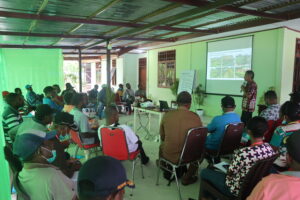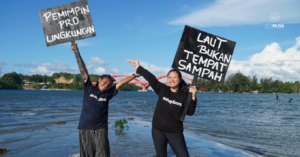
Appropriate management of biological resources and ecosystem services can provide an increase in the economy of local communities, especially indigenous Papuans (OAP), and encourage increased human resource capacity in sustainable development.
The Food and Land Use (FOLU) research conducted by the University of Papua team, the Center for International Forestry Research (CIFOR), the West Papua regional government and supported by the World Resources Institute (WRI) and the EcoNusa Foundation recommended a number of the potential and challenges of creating employment opportunities for OAP in the management of ecotourism, aquaculture, and sustainable food.
The topic was discussed in the special session of the 2019 Indonesia Development Forum entitled Food and Land Use in West Papua for Job Creation for Indigenous Papuans, in Jakarta (7/22). Present as speakers were Prof. Dr. Charlie Dany Heatubun, S.hut, M.Sc, FLS (Head of West Papua Province Research and Development Agency), Dr. Keliopas Krey (Member of the West Papua Province FOLU team), and Kristian Sauyai (Raja Ampat Indigenous People and Livelihoods Association / PERJAMPAT).
The land of Papua is a contributor to 50 percent of biodiversity in Indonesia so that preserving the presence of Papua’s forests means protecting biodiversity and the entire population of OAPs that depend on natural resources and forest ecosystem services.
The Food and Land Use Study conducted in early 2019 focused on the links between food, land use and management of forest and marine-based ecosystem services to ensure the sustainability of life and sustainable development in the province of West Papua.
Prof. Dr. Charlie Dany Heatubun, S.hut, M.Sc, FLS as the Head of the West Papua Province Research and Development Agency stated that the Food and Land Use study is in line with the vision of sustainable development in the province of West Papua which supports the improvement of people’s welfare through the preservation of biodiversity, utilization environmental services, creative economy, and increasing community participation.
Food and Land Use is a joint initiation, sustainable and integrated. “The results of this study can be used as a basis for policies to accelerate development in West Papua, which is right on target and provides great benefits for the welfare of the community, especially OAP.” Keliopas Krey, Member of the West Papua FOLU team.
Good management of forests and biological resources can guarantee food independence, improve nutrition and build quality and highly competitive human resources. This has become important for promoting inclusive and sustainable economic growth.
At present food availability in West Papua is sourced from local production and supplies from outside West Papua. The amount of food supplied from outside West Papua (East Java, South Sulawesi and North Sulawesi) amounts to> 80% compared to local food. This fact illustrates that West Papua has not yet established food.
The Government of West Papua Province in 2019 will continue to develop five strategic commodities that are the regional superior commodities. The five commodities include, cocoa, coffee, nutmeg, sago, and coconut.
In addition to food security, this study also examines aspects of aquaculture and ecotourism as an important part related to land use. Planning for aquaculture is needed considering the contours of the mountains in West Papua that are difficult to get sources of animal protein. While the development of ecotourism that involves the role of OAP needs more attention.
The tourism sector is one of the development priorities of the province of West Papua as set out in the fifth mission of the 2017-2022 Medium-Term Regional Development Plan (RPJMD). The development of ecotourism received more attention after West Papua declared itself a Conservation Province.
Kristian Sauyai as a representative of PERJAMPAT stated that the local community managing homestays in Raja Ampat saw the importance of protecting biodiversity and cultural diversity in managing ecotourism. “The environment is our identity as the Raja Ampat community and we are proud to be part of Raja Ampat, therefore we will continue to protect our nature so that our next generation can enjoy the same nature that we enjoy today,” he said.
The results of the Food and Land Use Study are expected to provide input on policy planning that encourages the cooperation of various parties in supporting the province of West Papua in developing an inclusive and sustainable economic model by utilizing the wealth in its forests.







